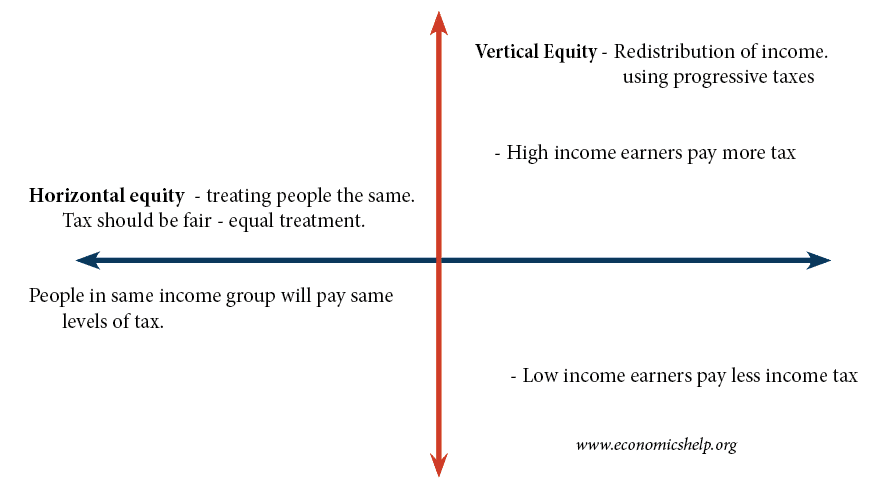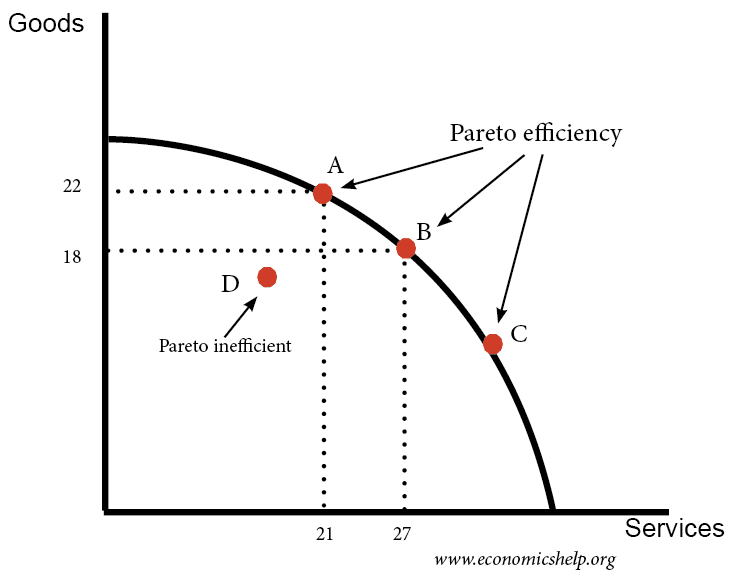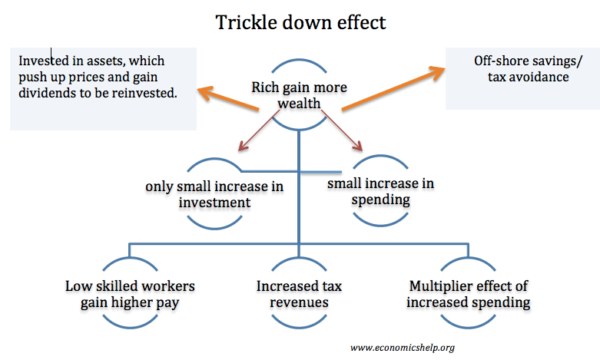A big issue in economics is the tradeoff between efficiency and equity.
- Efficiency is concerned with the optimal production and allocation of resources given existing factors of production. For example, producing at the lowest cost. See: Different types of efficiency
- Equity is concerned with how resources are distributed throughout society.
- Vertical equity is concerned with the relative income and welfare of the whole population e.g. relative poverty when people have less than 50% of average income. Vertical equity is concerned with how equitably resources are distributed and may imply higher tax rates for high-income earners.
- Horizontal equity is treating everyone in the same situation the same. e.g. everyone earning £15,000 should pay the same tax rates.

Efficiency may lead to less equity
The poll tax
The Community Charge (Poll tax) was a tax on every individual. Each individual paid the same amount – regardless of their income. It was considered to be economically efficient because a poll tax doesn’t distort economic behaviour. It has no impact on incentives to work because if you earn more, the tax you pay remains the same. However, by making a millionaire pay the same tax as a poor pensioner, it was considered to be unfair.
Cigarette taxes
A tax on cigarettes can be said to increase social efficiency. Cigarettes have negative externalities causing the social cost to be higher than personal cost. The cigarette tax makes people pay the full social cost of smoking and increases social efficiency. However, a cigarette tax is also highly regressive. It takes a bigger percentage of income from low-income earners.
Pareto efficiency
Pareto efficiency is concerned with creating a situation where we cannot make one party better off without making another party worse off. For example, a country may devote 60% of GDP to the manufacture of armaments. In doing this, they may achieve technical and productive efficiency and produce on their production possibility frontier. Therefore from this perspective, they are efficient. But, such an economy may have a great deal of inequality, with large portions of the population struggling to have enough to eat.

Bank bailouts and equity
From one perspective we may say bailing out banks is an economic necessity as it prevents a collapse in confidence in the banking system. By bailing out banks, we enable a more productively efficient economy.
However, from another perspective, it seems unfair that the government enables bankers to retain high paying jobs whilst they implement cuts for workers on lower-income.
Increased inequality and increased growth
Sometimes, economic policies create a situation where everyone becomes better off (rising real incomes across the population). However, those on high incomes gain a bigger percentage rise in real incomes. The result is that everyone becomes better off, but there is also greater income inequality. Therefore, some people may feel that relatively they appear worse off compared to others in society.
This is a pareto improvement in economic welfare but also an increase in inequality.
It is like the ‘trickle-down effect‘ – where the poorest only gain a small increase in their income. Whilst the rich gain a big percentage and bigger absolute increase in income. There is increased economic efficiency but increased inequality.
Is it good to have increased efficiency but increased inequality?
Yes
- Reduction in absolute poverty.
- Increase in real incomes – everyone is better off.
- Some feel that inequality creates incentives to work harder.
No
- People value happiness in terms of ‘fairness’ and relative perspectives. If the rich gain a bigger share of national income, it may create resentment.
- Diminishing marginal utility of income. Rich struggle to spend their increased income on goods which increase utility.
The final point is that there doesn’t have to be a trade-off between equality and efficiency. An improvement in efficiency should generally make the economy better off. There is no reason why improved efficiency has to lead to inequality. It is compatible to improve both efficiency and equity within society.
Related


Can you suggest why there can be no trade off between equity and efficiency?
Can someone please define Equity and explain it ? Thanks!
Equity requires that the state implement policy to attain a more equitable distribution of the economy’s resources. Equity in itself means equality that is to say the government needs to bring out policies that will help the economy grow. These policies must be implemented without any failure. In doing so, there the need for the state to implement a policy that will help distribute the resources attained equally to enhance development in the country.
Fairness
I got a question: economic efficiency includes both productive and allocative efficiency. if there is inequality, according to the definition of allocative efficiency, we cannot achieve allocative efficiency, so how we define the relationship between economic efficiency, a trade-off?
Something that is allocatively efficient does not need to be equitable. If the price of something is allocatively efficient, it simply means that the price of a product reflects the value consumers place on it.
If a government intervenes in a market to increase equity, the market gets distorted, and the price changes. This leads to a loss of allocative efficiency.
My point of view is that there is no possibility to choose between equity and efficiency, because achieving economic efficiency means achieving the full and ultimate or optimal output, and that does not basically mean achieving equity ; an absolute equity is not adequete to fulfil the ultimate welfare for society’s individuals except for the case of similiarity of all persons in society, which is impossibe to occur.
Can someone help me on this topic: Du u think that government is putting most of the emphasis on equity at the expense of efficiency.
Pls is the concept of optimality thesame as pareto optimality
Reply
Discuss the tradeoff between equity and efficiency